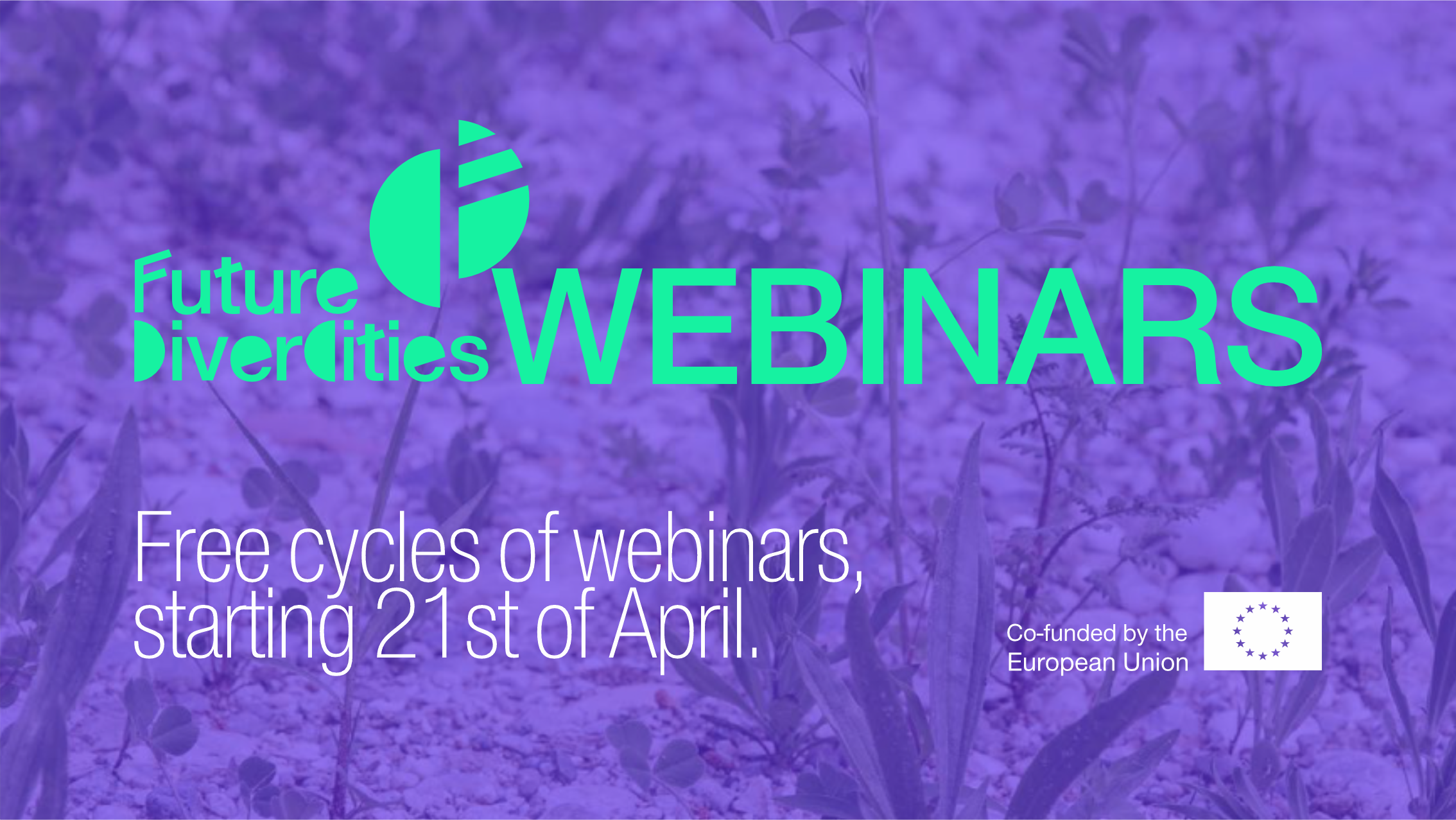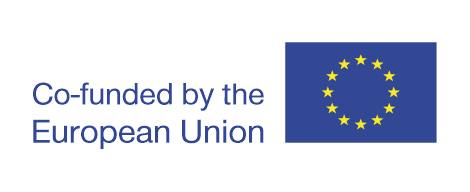Future DiverCities not only support the sparking of new cultural initiatives in eight cities across Europe. It also offers two series of training and knowledge sharing programmes, to build new capacities on innovative approaches for tackling the theme of temporary artistic uses, urban and territorial regeneration. The relevant knowledge is transferred to support local initiatives within the project, but it’s also an open and free opportunity for a wider community of European practitioners, social innovation and cultural organisations, and active citizens.
Starting April 2023 and developing until May 2024, a series of engaging webinars on urban ecology and changemaking programmes are proposed by two partners of the Future DiverCities project, Trajna and INNOCAMP PL.
The capacity building strand supports the partners and the local coalitions throughout the whole project. This is one of the factors that will enable continual innovation within each pilot intervention, with the wider aim of stimulating complex, quadruple helix patterns of collaboration by building a widespread ecosystemic capacity in each of the project cities as well as across them. Some of the concepts underlying the training method are the acknowledgment of the non-linear complexity of knowledge-based approaches, the relevance of ecosystem-based design in addressing urban transformation, and the difference that adopting a changemaking posture can bring in social innovation processes.
This free program online will be in English and is accessible by subscription (click here to subscribe and receive information to attend the webinars).
The School of Feral Grounds – proposed by Trajna
Urban Ecology webinars
Led by: Gaja Mežnarić Osole, Danica Sretenović
Originally produced for Future DiverCities partners and their local coalitions to empower eco-social engagement with neglected cityscapes.
The School of Feral Grounds situates cultural practices in the world in which capital-driven economies act as geological forces, terraforming the earth into a place where climate change, social inequality, and species extinction call for urgent collective action. The school acts as a forum for interchange, where reflections, concepts, case studies, and generative exercises invite participants to position urban ecologies within the field of culture by interlinking common notions of the urban and ecology. To engage with the feral grounds of 21st century cities we take a close look at the practices between the development of neoliberal cities and nature’s capacity to reclaim their cracks.
Situated in the experience of running the production laboratory Krater and the Feral Palace urgent pedagogy, the school nurtures a collaborative learning environment for thinking and engaging with untamed urban sites. To support their eco-social regeneration, it works to enhance cultural workers’ capacities in regenerative place-making and place-keeping, artistic curation, programming, and advocacy. It consists of three study modules (SM) developed and run by architect and theoretician Danica Sretenović and eco-social designer Gaja Mežnarić Osole together with inspiring guest speakers working in visual arts, curation, activism, geography, and ecology.
SM1: Human impacts on urban ecosystems ━ offers interactive lectures and live conversations with experts on practices that look at human impact at various scales: planetary, city, and site-specific. The module provides a framework to acquaint participants with the conditions of our contemporaneity – of the Anthropocene (April – June 2023);
SM2: Recontextualisation: tools of seeing site ecology and culture ━ a series of mapping and analysis exercises that explore the dynamics of the legal, organizational, more-than-human, and other constitutional bodies of the degraded sites in order to determine an in-depth location ID (November 2023).
SM3: Designing for regenerative landscapes ━ a cycle of talks and discussions with invited artists, designers, (landscape) architects, and ecologists to navigate the production of tactics & strategies for designing regenerative interventions (March–June 2024).
Upon commitment to the study programme, attendees will be asked to actively participate in learning sessions, discussions, and the production of documentation by contributing with feral maps, producing site-specific IDs, and developing regenerative tactics and strategies. The process of collective knowledge production will set the stage for an ‘international feral movement’ dedicated to identifying, valorising, and regenerating feral sites across Europe and beyond.
Trajna is a cultural organisation and interdisciplinary group of designers, makers, architects, and ecologists whose work focuses on restoring multispecies collaborations in urban ecosystems. Currently occupying 18ha of the feral urban ground Krater, the collective is set to produce environmentally conscious materials, infrastructures, and pedagogies to create new alliances across science, policymaking, and cultural production.
Changemaking webinars proposed by INNOCAMP PL
The training and mentoring support for changemakers and their stakeholders engaged in city empty spaces regenerative pilots is based on Ashoka’s concept of “every-one’s a changemaker” world. A Changemaker is a person who is sensitive to human/environmental needs critical of any form of injustice and responds to uncertainties by creative action. The most complex challenges (like city inclusive transformations) must be handled through collective changemaking by adopting a “team of teams” approach in which every stakeholder with a collaborative mindset is a potential expert but needs to find the right community to put her/his resources to the best effect on systems and framework changes. Ashoka’s definition of impact implies all the general social transformations provoked by its beneficiaries rather than only the part of the outcomes that can be attributed to the organization’s activities. The more equitable the process is the more transformative change you will achieve according to Ashoka’s.
The participants:
-will be invited to trainings for particular modules, the whole set of modules and the set of modules in combination of individual mentoring sessions,
-will be instructed and encouraged to use personal as well as project portfolios for recording their achievements and progress in changemaking capacity building.
Regenerative pedagogy necessarily includes embodied and experiential activities that honor the somatic and emotional intelligence of participants’, rather than solely rewarding demonstration of intellect or dominant modes of learning. It can be counterintuitive to slow down and take time to reflect when our overarching goal is to catalyze groups and social systems into new states of transformation. However, the capitalist conditioning that we have received—which values continued economic “growth” over learners’ well-being and thoughtful contemplation—is quite out of sync with nature’s patterns of cyclical development followed by senescence or disturbance, and finally, regeneration.
The program aims at exploring key enabling conditions for collaborative and regenerative changemaking on the basis of proven practices of Ashoka fellows and their organizations in ecology, community development, education and culture. The goal is therefore to equip the participants with the practical tools and mindsights needed to strengthen collaboration processes from personal perspective and to deepen individual collaborative leadership skills.
The learning journey has been designed in a way that can open up new or deepened awareness of the participant as a leader and of the dynamics in her/his project teams or even the entire multistakeholder team engaged in the project pilots. It will also help participants to reconnect with motivations behind regenerative changemaking and to make informed choices about which tools and frameworks will most effectively advance their projects. In between the sessions the participants will be expected to engage in a flipped learning process studying self-paced materials like videos, pdf texts and on-line articles or web-site content. They will make entries in their e-portfolios, share some content and request feedback from peers or/and experts/mentors.
INNOCAMP PL is an art-based training institute offering systemic interventions in which education stakeholders are included as changemakers. The company supports educators and employers through Innovation Pedagogy methods where ideas are generated, tested and co-designed to offer innovative solutions. INNOCAMP PL is under the umbrella of Ashoka, ranked 5th socially impactful NGO in the world, a leader in social innovation and changemaking. INNOCAMP PL has organized several innovation camps for social change in which Ashoka fellows served as facilitators and judges during the pitching sessions.
CALENDAR
Friday 21 April, 5.00pm CET, 90min
An online introduction to the webinars by Trajna and INNOCAMP PL.
The launch of the “The School of Feral Grounds” will start with a short presentation of the curators’ study scheme, which builds on the Feral Palace urgent pedagogy that addresses the invisibility and precarity of feral sites in the light of urban development mechanisms. The online study programme will be further introduced through its formats, knowledge practices, timeframes, and proposed outcomes. To wrap up, attendees will be encouraged to engage with the Urban Feral maps exercise, designed to ground the theoretical inputs through practical, in-situ activity.
The second part of the webinar entitled “Changemaker’s e-portfolio” is proposed by INNOCAMP PL. In this introductory session the participants will find out how to embark on a journey to transform from passionate activist into a professional changemaker supported by a coalition of multi-stakeholders with a strong regenerative intent. They will learn from the leading social innovators in Finland and Poland (ASHOKA fellows) how to collaborate to achieve systemic change. They will build their own e-portfolio to trace their progress and use it as a tool for transformative change they want to lead collaboratively.
Friday 5 May, 5.00pm CET, 90min
An online learning lab by INNOCAMP PL
“Module 1: Changemaker’s identity” facilitated by Ashoka fellows Adam Jagiello-Rusilowski and Markus Raivio.
The participants will be invited on a self-development journey to critically analyze their personal resources for changemaking in the context of city regeneration and their role within the Future DiverCities pilots and other project phases. They will be recommended to do some reading, reflect on their own past experiences and (re)design themselves as changemakers. In real time meetings they will do some case-study of selected ASHOKA fellows, interview each other, get feedback on their strengths, solve sample divergent problems to explore situations of uncertainty, record their learnings in multiple roles and receive feedback based on their electronic portfolios.
Wednesday 10 May, 5.00pm CET, 60min
A video lecture and an online discussion by Trajna.
“The School of Feral Grounds – The Planetary Scale: Short introduction to the Anthropocene” curated by Gaja Mežnarić Osole and Danica Sretenović, followed by a discussion with Debra Solomon and Aljoša Petek.
Before delving into the specific topics of urban ecology, the introductory lecture will offer a set of philosophical concepts, scientific findings, and situated observations for understanding the contemporary planetary condition – the Anthropocene. It’s hard to imagine that what we do locally has widespread influence across the planet, as we are not tuned to think at large scales. We need to learn how to recognise the entanglements and situate our cultural practices in the world in which human-led activities – more precisely capital-driven economies – act as geological forces, terraforming the earth into a place where climate change, species extinction, and non-human invasions call for our collective action.
The lecture will be followed by a live discussion with invited guest speakers and participating members of the audience.
Thursday 1 June, 5.00pm CET, 60min
A video lecture and online discussion by Trajna
“The School of Feral Grounds – The City Scale: Feral urbanism for 21st century cities that were once cultivated and went wild” curated by Gaja Mežnarić Osole and Danica Sretenović, followed by a discussion on public good ground with Urška Kristina and place-making with Ibrahim Mahama.
The lecture will discuss often invisible though instrumental operations fuelling urban inequalities – physical manifestations of neoliberal governance models and policies, protocols of land trade, and the lack of legislation acknowledging multispecies spatial rights. How to treat such knowledge as the object of cultural politics? To exercise urban ecologies as a viable alternative to the production of neoliberal cities we will track recent histories of transformations of exemplary typologies of wastelands to re-examine categories including ownership, user, land use, programme and heritage; and the possibilities of subverting existing categories within cultural programming and from the multispecies point of view. In order to effect a paradigmatic shift in urban development, which is instrumental in bringing about social and environmental inequalities – such as pollution, extraction, devastation of biodiversity etc. – we oppose unlimited growth with feral tactics, in the process creating conditions for the new urban (ecologies).
The lecture will be followed by a live discussion with invited guest speakers and participating members of the audience.
Thursday 8 June, 5.00pm CET, 120min
An online learning lab by INNOCAMP PL
“Module 1: Changemaker’s resilience” facilitated by Ashoka fellows Markus Raivio, Adam Jagiello-Rusilowski and Misha Czerniak.
The participants will be invited on a self-development journey to critically analyze their personal resources for changemaking in the context of city regeneration and their role within the Future DiverCities pilots and other project phases. They will be recommended to do some reading, reflect on their own past experiences and (re)design themselves as changemakers. In real time meetings they will do some case-study of selected ASHOKA fellows, interview each other, get feedback on their strengths, solve sample divergent problems to explore situations of uncertainty, record their learnings in multiple roles and receive feedback based on their electronic portfolios.
Thursday 15 June, 5.00pm CET, 60min
A video lecture and online discussion by Trajna
“The School of Feral Grounds – The Site Scale: Feral ecosystems as laboratories for cultivating interspecies collaboration & care” held by designer Gaja Mežnarić Osole and ecologist Primož Turnšek, joined by an independent landscape architect, artist, writer, and curator Violeta Burckhardt as a guest speaker.
.
As a consequence of diverse political and economic conflicts, our post-industrial cities are seeing a rise in neglected urban environments (e.g. construction sites, houses, factories, roads etc.) reclaimed by nature. While invisible on planning documents, these largely overlooked yet highly productive green spaces have the capacity to regulate the climate, enhance biodiversity, provide irreplaceable ecological infrastructure, and give rise to research platforms for learning about eco-cultural regeneration. If the citizen’s role is often limited solely to the users and admirers of urban parks and forests, then these anthropogenic ecosystems, populated with invasive and other feral plants, human infrastructures, and fugitive compounds ask us for active, attentive engagement. They call for a new generation of care workers who know how to practice slow disturbance through the nurturing of interspecies collaborations. If we were able to recognise the educational, ecological, and cultural value of spontaneous ecologies, could we plan the city by integrating their vital existence into such schemes? Instead of treating them as precarious landscapes on the road to extinction at the hands of human-centric infrastructures, this lecture will explore feral ecosystems as creative laboratories of multispecies encounters and care.
The lecture will be followed by a live discussion with invited guest speakers and participating members of the audience.



